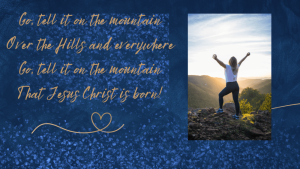Go, tell it on the mountain, over the hills and everywhere
Go, tell it on the mountain that Jesus Christ is born (Chorus)
While shepherds kept their watching o’er silent flocks by night
Behold throughout the heavens there shone a Holy light
(Chorus)
“Go Tell It on the Mountain” is one of the most well-known and beloved Negro spirituals and represents just one of the countless contributions made to American music by enslaved people. These songs represented a passion for life and living despite the suffering, humiliation, and unimaginable cruelty of slavery.
The shepherds feared and trembled, when lo! Above the earth
Rang out the angel chorus that hailed the Savior’s birth
(Chorus)
Because most slaves were uneducated, these songs were passed along through a vibrant and rich oral tradition and were eventually captured and written down by one special American family. Not long after the Civil War, John Wesley Work, a Black choir director in Nashville, Tennessee, began a mission to write down melodies and lyrics of these well-known songs, often traveling hundreds of miles to seek former slaves who had sung this and other songs while they labored.
Down in a lowly manger, our humble Christ was born
And brought us all salvation that blessed Christmas morn
(Chorus)
Work’s passion for the music and history of these plantations songs was passed on to his son, John Wesley Work II, whose wife was the music teacher at nearby Fisk University, one of the first universities for Blacks in the south. Beginning in 1871, the Fisk Jubilee Singers went on tour introducing the world to the genre of Negro spirituals while raising funds to keep the doors of their school open. Before long, their repertoire of uplifting spirituals not only saved their university but earned them world-wide recognition including notable audiences with President Chester Arthur and Queen Victoria.
When I was a seeker, I sought both night and day,
I asked the Lord to help me, and he showed me the way.
(Chorus)
During the Great Depression, John Work III, also embraced his family’s passion for preserving old Negro spirituals and took special interest in “Go Tell It on the Mountain.” Through his own interviews and research, he changed the arrangement and added a stanza. In 1940, he published his rendition in his book American Negro Songs and Spirituals and is the version we know today.
Although the creators of spirituals like “Go Tell It on the Mountain” will forever remain anonymous, the Work family and the Fisk University Jubilee Singers have played an important role in preserving and popularizing this uniquely American genre of music.
He made me a watchman upon a city wall
And if I am a Christian, I am the least of all.
(Chorus)
I have several versions of Go Tell It on the Mountain in my Christmas playlist: The Golden Gospel Singers, Sara Evans, and For King & Country.
Your turn: Do you have Go Tell It on the Mountain on your Christmas playlist? If so, which version? If not, which version above is your favorite?

